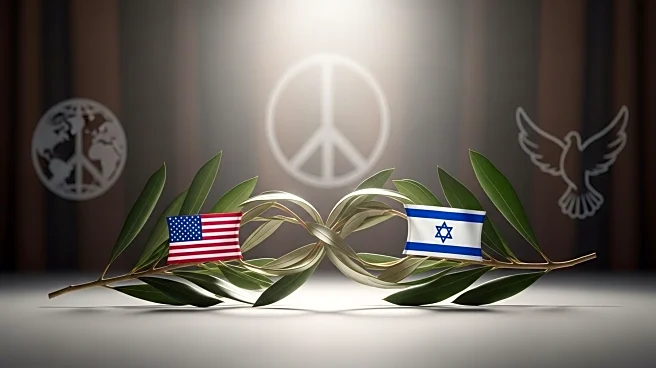What's Happening?
Senior figures from the United States and Israel have arrived in Egypt to participate in talks aimed at ending the ongoing conflict in Gaza. The discussions have been bolstered by Hamas handing over lists of hostages and Palestinian prisoners for a potential swap. President Trump's 20-point plan is reportedly closer to fruition than previous efforts to halt the war. The talks, which began in Sharm el-Sheikh, include key figures such as Jared Kushner and Steve Witkoff from the U.S., and Ron Dermer from Israel. Turkey's Foreign Minister Hakan Fidan has noted significant progress in the negotiations, with a ceasefire potentially on the horizon if a positive outcome is reached. However, critical issues remain unresolved, including the timing of Israeli withdrawal and the future governance of Gaza.
Why It's Important?
The negotiations are crucial as they could lead to a ceasefire and potentially end a conflict that has resulted in significant loss of life and destruction in Gaza. The talks are significant for U.S. foreign policy, showcasing President Trump's involvement in Middle Eastern peace efforts. The outcome could impact regional stability and influence U.S. relations with both Israel and Palestine. The potential release of high-profile Palestinian prisoners could shift political dynamics within the region. Additionally, the discussions may set a precedent for future peace negotiations involving other conflicts.
What's Next?
The next steps involve resolving key sticking points such as the mechanism for Israeli withdrawal and the governance of Gaza post-conflict. European, Arab, and other states are set to meet in Paris to discuss Gaza's transition, with U.S. representation likely. The role of Hamas in Gaza's future governance remains a contentious issue, with various stakeholders opposing its involvement. The international community will closely monitor the talks, as their outcome could influence broader geopolitical strategies and alliances.
Beyond the Headlines
The talks highlight the complex interplay of international diplomacy, with countries like Turkey playing a significant role. The negotiations also underscore the challenges of balancing humanitarian concerns with political objectives. The potential involvement of an international body in Gaza's administration raises questions about sovereignty and self-determination for Palestinians. The discussions may also influence future U.S. diplomatic strategies in the Middle East, particularly regarding conflict resolution and peace-building efforts.










